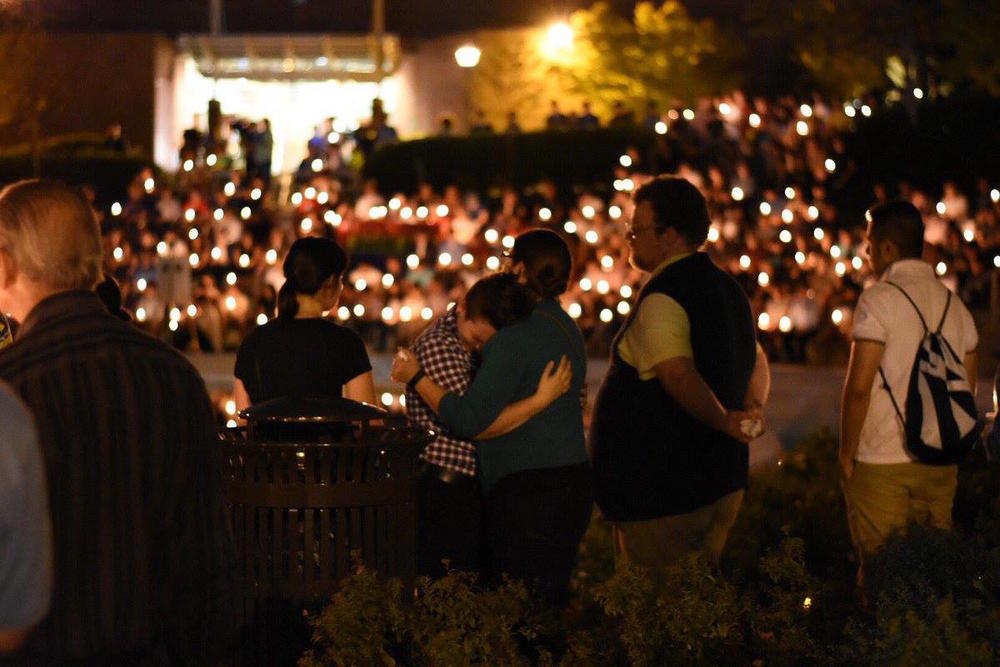Section Branding
Header Content
Advocates Want More Police Training For Mental-Health Issues
Primary Content
Supervisors for the Georgia Tech police officer who fatally shot a student thought the officer showed promise, but there is no evidence that he had received the kind of training that advocates say is crucial to effectively interact with people who have mental-health issues.
Officer Tyler Beck fatally shot Scout Schultz on Sept. 16, the Georgia Bureau of Investigation has said. Beck and other officers responded after Schultz called 911 to report an armed suspicious person, investigators said. Police have said Schultz had a knife and refused to drop it after repeated commands.
A lawyer for Schultz's parents, Chris Stewart, has said that Schultz appeared to have been experiencing a psychological breakdown, and that Beck overreacted by shooting when non-lethal force could have been used.
"Police are responding to medical emergencies and often they don't have the training to recognize even that there is a medical emergency happening," said Laura Usher, senior manager for criminal justice and advocacy at the National Alliance on Mental Illness.
Usher, Stewart and others say more officers need to be specially trained to respond to calls involving mental health problems.
Such training, known as Crisis Intervention Team training, began at the University of Memphis after a police shooting in that city in 1987, and is now available across the country — but many sworn officers have not gotten it, Usher said.
"A typical police response to someone holding a weapon is for a couple of officers to draw their guns to point them at the individual and say, 'Drop the knife, drop the knife, drop the knife!' really fast and really loud. And that works on a lot of people," she said. "But what the training teaches them is that in a mental health crisis, that kind of loud, fast, repetitive command actually might escalate the person more than they expect."
In Georgia, the 40-hour training is required of Georgia Bureau of Investigation agents and other state law enforcement officers, but not for local police officers who patrol cities, counties and college campuses, said Ryan Powell of the Georgia Peace Officer Standards and Training Council.
Cedric Alexander, a former Georgia police chief who served on President Barack Obama's police task force, says it should be given to every officer in the United States.
"That is critically important training," said Alexander, the former public safety director in DeKalb County, Georgia. The training gives officers encountering mentally ill people a chance "to come to some peaceful resolve."
Beck had been an officer for about 16 months, and training records released by the state do not indicate that he took part in the specialized training.
Fewer than one-third of Georgia Tech's police officers have undergone the 40-hour course, according to records released by the school.
Statewide, about 11,000 of Georgia's roughly 56,000 sworn officers have the specialized training, said Georgia Bureau of Investigation Special Agent Debbie Shaw, who manages the Crisis Intervention Team section. State officials are working to expand the program to train more officers in coming years, she said.
All prospective officers in Georgia who graduate from the state's law enforcement academy do get four hours of training in crisis intervention, as well as a six-hour course that covers mental health and substance abuse, Powell said.
Beck was hired as a public safety officer in July 2015. In an evaluation covering a period from August 2015 to January 2016, a supervisor wrote that Beck had "done an outstanding job learning what it takes to be in the Public safety field" and would likely continue to do well as he worked his way up to become a police officer with the department.
___
Associated Press Writer Kate Brumback contributed to this report.
___
This story has been corrected to reflect that Beck was hired in July 2015, not August 2015.

